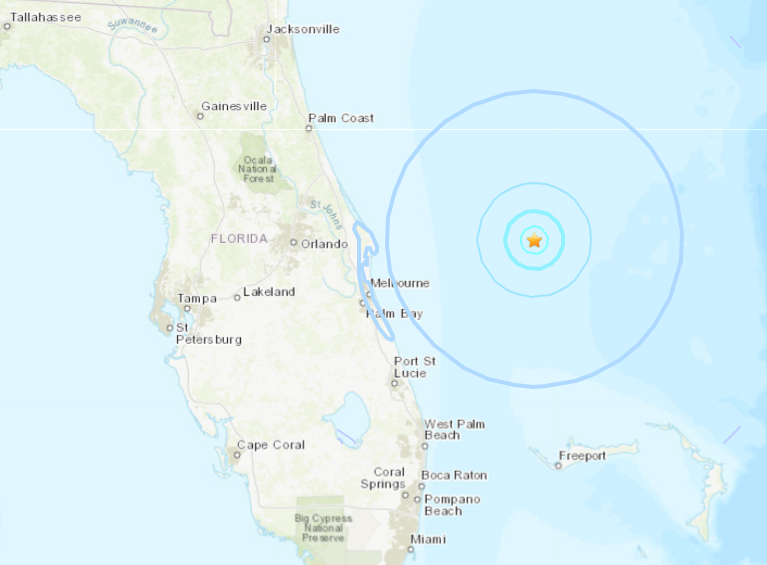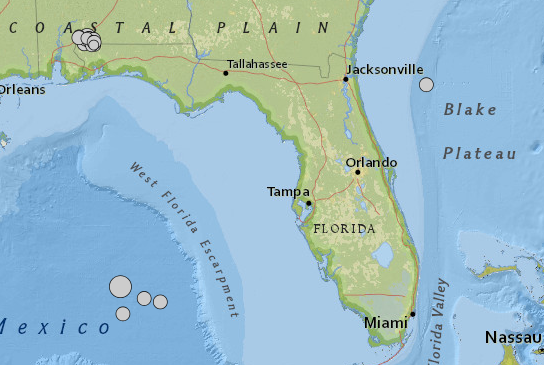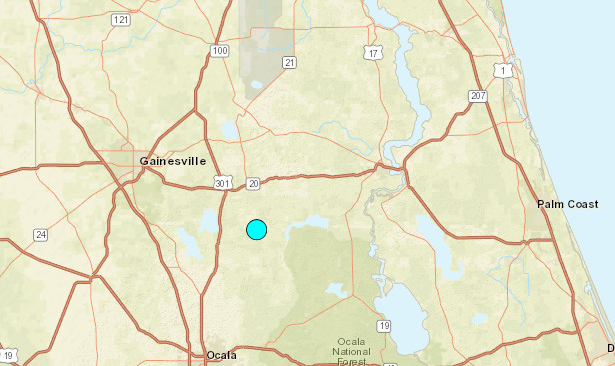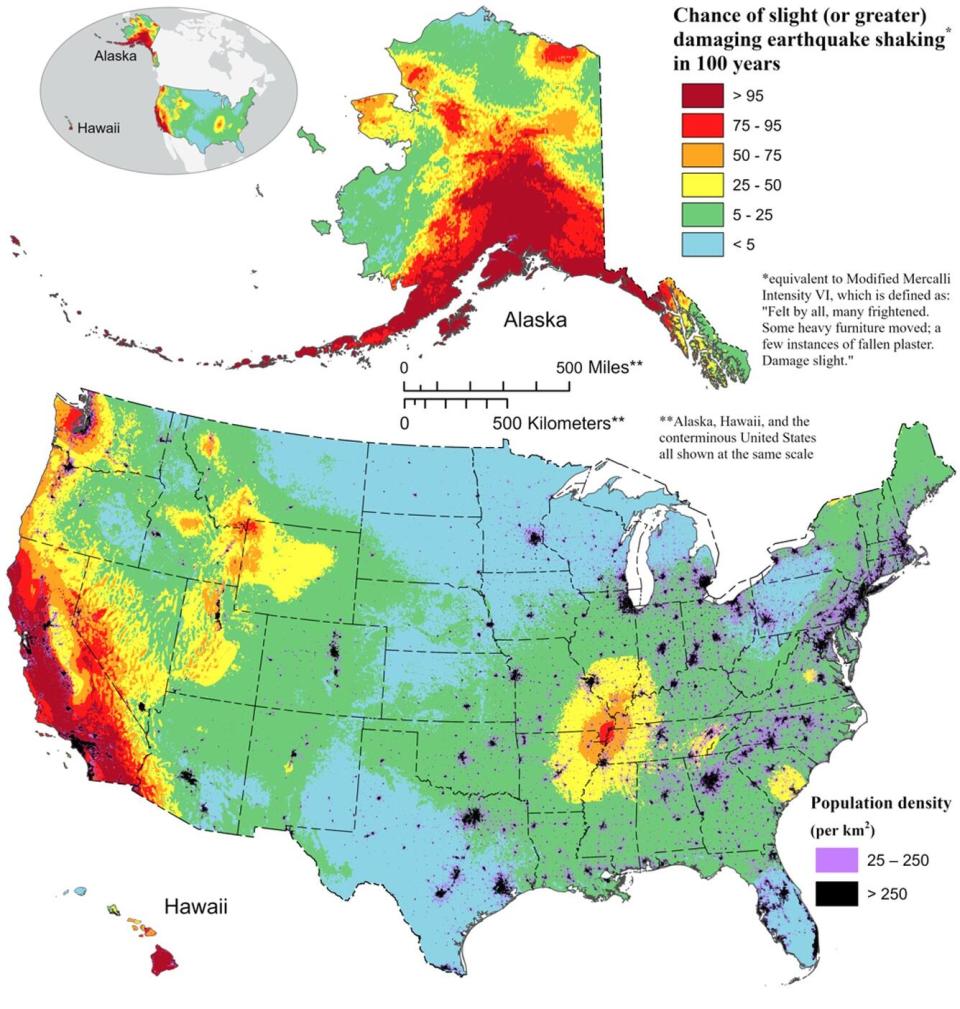After 4.0 earthquake east of Cape Canaveral, should Florida be concerned? What to know
A 4.0 earthquake hit off Florida's East Coast on Wednesday night.
While earthquakes are rare in and around Florida, they do happen, although not usually of the magnitude of the Feb. 7 quake.
Here's what we know about Wednesday's earthquake and the history of quakes both in Florida and nearby in the Gulf of Mexico and Atlantic Ocean.
What was the epicenter of the Florida earthquake?

The earthquake happened 101 miles east of Cape Canaveral, Florida.
How strong was the earthquake off Florida Feb. 7, 2024?
The earthquake registered a magnitude of 4.0, according to the U.S. Geological Survey.
Earthquakes measured by magnitude. Here's what the numbers mean
2.5 or less: usually not felt but can be recorded by seismograph.
2.5 to 5.4: often felt, but causes minor damage.
5.5 to 6.0: Slight damage to buildings.
6.1 to 6.9: May cause major damage in populated areas.
7.0 to 7.9: Major earthquake causing serious damage.
8.0 or greater: Great earthquake that can destroy communities near the epicenter.
Florida earthquake by the numbers
Intensity: 4.0
Time: 10:48 p.m. Wednesday, Feb. 7, 2024
Location: 101 miles east of Cape Canaveral; 163 kilometers east of the Cape
Longitude and latitude: 28.557°N 78.944°W
Depth: 6 miles; 10 kilometers
Florida earthquake: Reactions on Twitter, social media
Residents from Merritt Island to Palm Bay reported feeling the earth shake. Several took to social media:
Melbourne #earthquake me lying in bed like - pic.twitter.com/EfjmM0Nqfh
— Bee ♡ (@beezzh) February 8, 2024
Obligatory everyone running to Twitter because of #earthquake #Melbourne
pic.twitter.com/BQyBkEgF7q— Nicholas Chiu (@_NicholasChiu_) February 8, 2024
Am I the only one who just felt the tremors of #earthquake in #Melbourne 😀 pic.twitter.com/nAV2UiW29Q
— Chetan Arora (@chetan_arora) February 8, 2024
WHoa did anyone feel the Florida #earthquake ???? pic.twitter.com/MvvRwqeis1
— PhotographicFloridian (@JackLinFLL) February 8, 2024
Some confused earthquake with launch from Cape Canaveral
NASA's PACE spacecraft launched at 1:33 a.m. atop a Falcon 9 spacecraft from the Cape Canaveral Space Force Station, sending a rumble across the Space Coast followed by a sonic boom with the booster's return.
Florida earthquake one of more than 200 recorded Feb. 7
The USGS reported more than 200 earthquakes around the world on Feb. 7, with many of them occurring in the United States.
Several posts on X, formerly known as Twitter, from California poked fun at a recent earthquake in Oklahoma, although there were earthquakes reported Wednesday in not only California, but also Alaska, Washington, New Mexico, Hawaii, Missouri, Nevada and Idaho.
#earthquake in Oklahoma...well sorry guys but as a California native, I gotta say it like this: pic.twitter.com/ITUtaD6NQx
— Tim Maloney (He/Him) 🦈 🦇 🇵🇸INFJ Free Palestine (@timmal510) February 3, 2024
How common are earthquakes?
The National Earthquake Information Center reports there are about 20,000 earthquakes around the globe each year, or approximately 55 every day.
According to records dating back to about 1900, about 16 major earthquakes happen every year, according to the U.S. Geological Survey.
That includes 15 earthquakes in the magnitude 7 range and one earthquake of magnitude 8.0 or greater.
What about Florida? How common are earthquakes?

There have been earthquakes in Florida, with most clustered in the northwestern Panhandle.
There have been more than 20 earthquakes reported in Florida since 1992, immediately north of the state's border in Alabama, or off the coast in the Gulf of Mexico and Atlantic Ocean, according to the U.S. Geological Survey.
What's the largest earthquake recorded in Florida?

According to the University of Florida, geologists agree the largest earthquake ever recorded in Florida happened on Jan. 12, 1879, about 11:45 p.m. It measured 4.4.
"A pair of 30-second tremors, possibly centered in the Palatka area, sent crockery tumbling off shelves and jolted startled residents awake in a large part of north Florida," UF said.
"According to news accounts, the quake was felt in Cedar Key, Gainesville, Jacksonville, St. Augustine and Tallahassee, among other cities."
Looking offshore, an even larger earthquake was felt in Florida after a 5.9 quake occurred under the Gulf of Mexico Sept. 10, 2006. It rocked Southwest Florida.
Why aren't there more earthquakes in Florida?

Florida is among the most geologically stable areas in the United States.
“We have had earthquakes in Florida — and we could have one today — but it’s not as likely as other places,” said Doug Smith, professor of geology and longtime director of the University of Florida’s seismic network in 2000.
The closest fault line to Florida runs through the Caribbean Sea, just north of Puerto Rico and the Dominican Republic and south of Cuba toward Guatemala.
Most of Florida has a 5% chance or lower of experiencing a damaging earthquake in the next 100 years. But the Panhandle and an area of North Florida down to a line stretching from Jacksonville southwest to south of Cape Coral has a 5-25% chance, the agency said.
J.D. Gallop, C.A. Bridges and Samantha Neely contributed to this report.
This article originally appeared on Treasure Coast Newspapers: Florida earthquake: How strong was it, Twitter reactions to Feb. 7 quake

